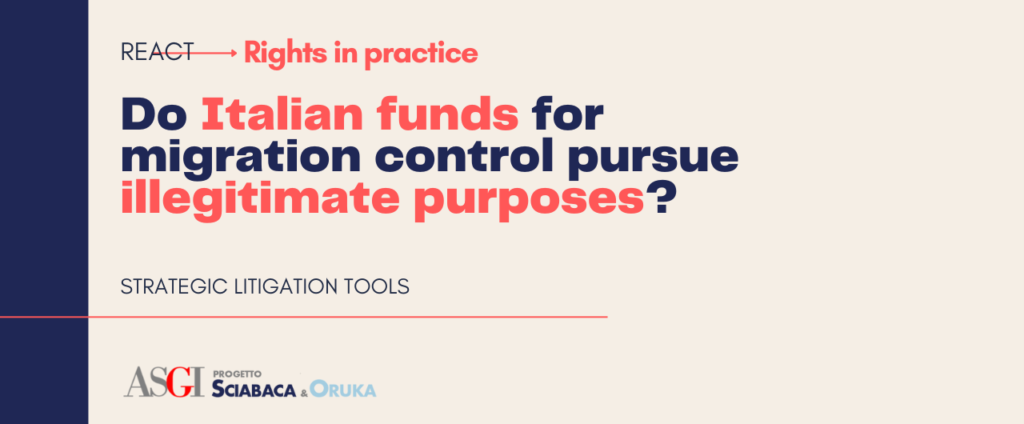
What it is about
Over the past few years, both the Italian government (through the Ministry of Interior and the Ministry of Foreign Affairs and International Cooperation) and the European Commission have allocated large sums of money to the countries of origin and transit of third country nationals reaching the Member States.
Initially, (around 2016-2018 when the African Fund and the EU Emergency Trust Fund for Africa – EUTFA were implemented) the narrative focused on the fact that these resources, intended for development projects, would have led to a decrease in migration and to a greater cooperation of governments in readmission policies.
Subsequently, governments started to talk more and more openly and to approve without hesitation projects and funding intended, on the one hand, to structure and strengthen border controls that prevent mobility (think of Libya, Niger, Tunisia, Sudan) and, on the other hand, to tie funding to cooperation on return of irregularly staying migrants.
In this context, we questioned whether these funds are legitimately allocated, i.e. whether they pursue legitimate purposes according to our legal system.
Is it legitimate to strengthen the Libyan Coast Guard in its effort to intercept people at sea?
Is it legitimate to provide equipment and training to Gambian and Senegalese police guards in order to prevent the departure of individuals who want to leave these countries?
Is it justifiable to make development projects conditional on return cooperation?
What has been done
In order to answer these questions, we undertook a work of mapping and analysing the border control funding provided by the Italian government to foreign authorities, in order to become aware of the content of the funded projects and to initiate litigation where the funds were spent for purposes not compatible with our legal system.
The tool we used was that of civic access, through which we could, on the one hand learn the contents of the public administration activities, and on the other hand, develop, on the basis of information and documents collected, strategic litigation actions in an attempt to change the lines of intervention. Sometimes we obtained the information we requested, other times we had to appeal to the administrative judge.
In one case, we challenged an expenditure decree by which the Ministry of Foreign Affairs allocated public resources to equip the Libyan Coast Guard with four patrol boats used to intercept migrants at sea and take them back to Libyan detention centres. On that occasion, the Council of State considered that the expenditure was compatible with the principles of Italian law, in particular because NGOs and international organisations were implementing projects to improve the conditions of detention centres.
Therefore, we would like to further experiment with litigation activities in order to question the legitimacy of funds that lead to encouraging practices of pushbacks, restriction of freedom of movement and of access to the right to asylum.
What else can be done
We believe that the first strategy is to monitor, share press articles and news about projects and funding, and to ask, as individuals and associations, that all information regarding the way public resources are spent be published.
Members of Parliament could require the ministries of Interior and Foreign Affairs to make expenditure decrees public at all times, in order to allow a continuous control by civil society of how public resources are spent within the policies of migration and border control.
For further information, see:



